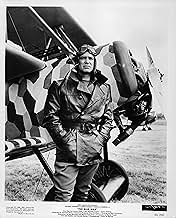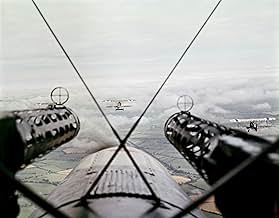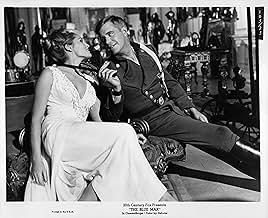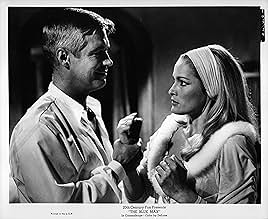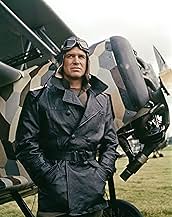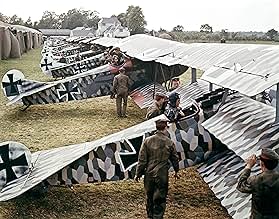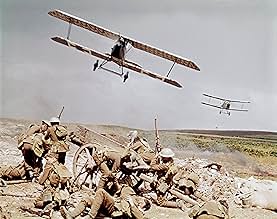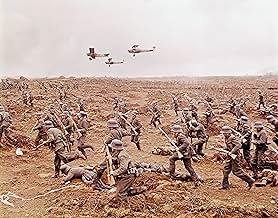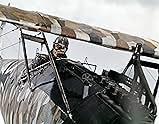Un giovane e ambizioso pilota tedesco nella Prima guerra mondiale, disprezzato per le sue umili origini, insegue ossessivamente la medaglia assegnata per 20 vittorie aeree.Un giovane e ambizioso pilota tedesco nella Prima guerra mondiale, disprezzato per le sue umili origini, insegue ossessivamente la medaglia assegnata per 20 vittorie aeree.Un giovane e ambizioso pilota tedesco nella Prima guerra mondiale, disprezzato per le sue umili origini, insegue ossessivamente la medaglia assegnata per 20 vittorie aeree.
- Regia
- Sceneggiatura
- Star
- Ha vinto 1 BAFTA Award
- 1 vittoria e 5 candidature totali
- Elfi Heidemann
- (as Loni Von Friedl)
- Feldmarschall von Lenndorf
- (as Friedrich Ledebur)
Recensioni in evidenza
I saw this movie with my father in 1966. He always loved the bi-planes of World War I and they thrill me to this day.
The title, though central to the theme of the movie is really a misnomer to the enjoyment of this film. You actually get to see r-e-a-l aircraft in combat without the cartoon effects of CGI.
This is movie making in the school of the other Cinamascope greats: Somewhat weak on plot, but so absolutely cool in visual execution, that you overlook the script's lack of depth.
I'm not saying that this movie doesn't have a plot. It's a solid story with somewhat shallow character development. But in the end, the characters were secondary to a story of bravery, early air war history and tactics and the wearing away of chivalry in an era of a nation fighting for survival in the end of hours.
Acting was good, direction was fine and choreography using actual aircraft was among the last of it's kind.
I give this an 8 out of 10 for displaying concrete reality in an era of cartoon gimmicks.
George Peppard plays a more ruthless version of the Brando character in the previous generation in The Blue Max. He's a survivor of the trenches who gets an opportunity to learn to fly and transfer in the Air Corps. What comes with it is a commission and while Peppard is now an officer he's no gentleman.
There's a whole different ethic operating in the Air Corps. The pilots see themselves as an updated version of the Teutonic Knights of old. A view by the way shared by both sides. The fliers on both sides see themselves as old fashioned chivalrous sorts who glory in single combat. They are also upper middle class and aristocratic types and Peppard doesn't quite fit in.
You can put him in a biplane and give him rank, but his outlook doesn't change. What Peppard does see is that if he makes 20 confirmed kills he gets awarded the Blue Max decoration and his future and respectability is secure.
James Mason who commands the Flying Corps takes an interest in Peppard's rise. His political instinct tells him revolution is in the body politic. Make heroes out of someone like Peppard who would be part of the proletarian masses will help give those masses a vested interest in the Wilhelmine regime and would forestall revolution. Of course wife Ursula Andress has some different ideas about Peppard.
I like The Blue Max because it is a film about more than aviation. It is about what was happening in Germany during those last days of World War I when Germany was desperately trying to break the stalemate on the western front and pull out a victory before American troops were in sufficient numbers. They almost pulled it out in fact. It's about attitudes, old, new and changing. All three of the leads suit their roles perfectly.
As a veteran of World War I if he didn't gain the respectability out of the war he craved, Peppard would have been ripe for the Nazi propaganda that filled Germany and was finally heeded during the Depression. The Nazis filled their ranks with Peppards up and down Germany.
Which is why The Blue Max should be seen and learned from because it is not just about World War I aviators as good as the aerial footage is here.
Since the release of "Flyboys" it seems amazing that a movie made forty years ago has a more polished, advanced, and contemporary look than one made today. This will amaze people who compare films of the twentieth century one hundred years from now."The Blue Max" has better cinematography, special effects, acting, storyline, etc. In the end its a disappointing fact that today's films have taken giant steps backwards compared to those of the '60s.
The flying sequences and scenes of aerial combat in "The Blue Max" have never been surpassed or equaled. Even in "Flyboys" with millions of dollars of CGI effects no movie has ever captured the feel of flying and aerial fighting like this one. The planes all look authentic, too.
The big scope of World War One does not swallow up the intense personal stories here either. This is one of the only films that explores the psyche of successful fighting men. The arrogance they need to maintain their bravery and aggression can also be their downfall. Here we also can see the politics behind the combat, both on a personal and national level. This is a very thrilling history lesson.
The actors are so good, and the characters so complex I forgot they were supposed to be my (supposed) enemy. Peppard does a good job of acting, playing a guy who is meant to be both likable, admirable, irritating and repulsive at the same time. The only problem is he looks too American for the role. Imagine if Brando had done it, but he had a hard time choosing really good parts. My favorite is James Mason, who played German generals better than they could play themselves off-screen. If you like flying, history, or personal drama you can't miss this one.
The image is sharp and the colors are vivid. The sound is a bit conventional, but since the story is all-encompassing and well developed you will probably forget all technicalities and just sit through an excellent movie as I did.
The story deals with a simple German infantry soldier, stuck in the horror of the trench warfare, who dreams to fly and become an ace.
Well, he doesn't have to wait long and soon he's a flyer. he also becomes an ace.
Unfortunately, his modest social origins, keep him from the Sun, the Blue Max in fact. The Blue Max is the highest ranking medal given to pilots in WWI.
Knowing that, Stachel (Peppard) decides to fight all the odds and becomes totally ruthless and opportunistic.
Unluckily for him, two can play at the same game. The German Reich needs a hero, an example to play its cards right, in order to have more draftees to send to the front.
Stachel becomes such a hero, but to a price...
It is a crude and cruel depiction of the rise and fall of someone who came from nothing and through war, thought he could make it in society, only to find out that certain games are better left alone.
A very good morals and ethics lesson, from which many people could still learn something.
I can only suggest it. The rest is up to you.
This movie tells the story of Bruno Stachel, an ordinary infantry soldier who has been turned into a fighter pilot. His colleagues aren't happy with him, not only because he isn't an aristocrat like they are, but also because he's extremely ambitious. He will do anything to win him his country's most honored medal, the Blue Max. But to win it, he'll have to shoot down 20 enemy aircrafts, which will all have to be confirmed by his comrades, without getting killed himself. And while being hated by his fellow pilots, he's seen as the people's hero and perfect propaganda material by the general and as the ideal lust object by the general's wife...
"The Blue Max" shows very well how the pilots during WWI were almost always noblemen (I guess the most famous one of them all was Manfred Freiherr von Richthofen, better known as the Red Barron), who considered the concept of an honorable death at the hands of a "worthy" opponent still as one of the most important things during their fights. Even at the end of the war in 1918, while on the ground troops had been anonymously slaughtered by the thousands with machine guns and gas, they still considered chivalry as one of the highest goods.
Next to the historically correct situation of the story, I also admire the rest of the movie. I know, if you aren't interested in WWI, than this might not be the most spectacular movie you've ever seen, but even than the movie has plenty of good and interesting things to offer. The story on itself is nice, the acting is very good and the airplanes are magnificent to watch, on the ground as well as in the air. This is one of those movies that has stood the hands of time, but that is known by only a small audience, which is really a shame. Personally I'm a big fan of this movie and that's why I reward it with an 8/10. My advice: don't call "Top Gun" the ultimate fighter pilot movie before you've seen this one.
Lo sapevi?
- QuizFox wasn't able to rent any of he surviving WWI planes still extant, so they built their own. The aircraft were later used in "Darling Lily" and "You Can't Win Them All."
- BlooperThe German award called the "Pour le Mérite" (a.k.a. the Blue Max) was awarded at the beginning of the war to pilots who shot down 8 enemy aircraft; that was later raised to 16. The requirement was never 20 as depicted here.
- Citazioni
Willi von Klugermann: By the way, Stachel... there's an impression around that... you care more about your unconfirmed kill than you do about Fabian's death.
[long pause]
Bruno Stachel: Perhaps it's force of habit. In the trenches, we couldn't even bury the dead; there were too many of them. I've never had the time... to discuss them over a glass of champagne.
- Versioni alternativeIt is believed that this film was at one time released in a 70 mm version (because of its six channel soundtrack), but this has never been confirmed.
- ConnessioniFeatured in The Amazing Howard Hughes (1977)
- Colonne sonoreDeutschlandlied
(uncredited)
Music by Joseph Haydn
Lyrics by August Heinrich Hoffman von Fallersleben
Played at Stachel's medal presentation
I più visti
- How long is The Blue Max?Powered by Alexa
Dettagli
Botteghino
- Budget
- 5.000.000 USD (previsto)
- Tempo di esecuzione2 ore 36 minuti
- Colore
- Mix di suoni
- Proporzioni
- 2.35 : 1
Contribuisci a questa pagina



